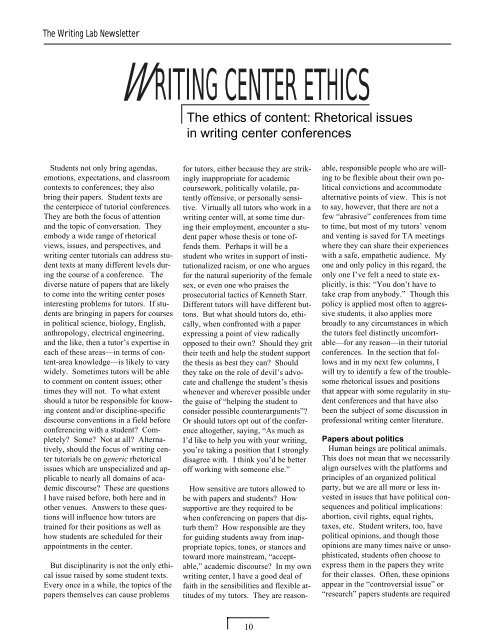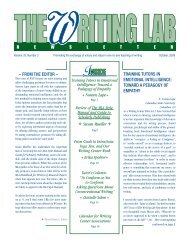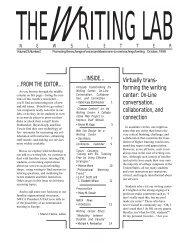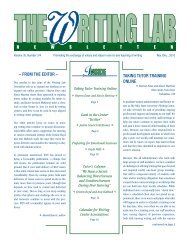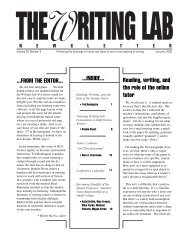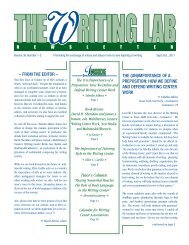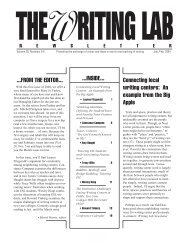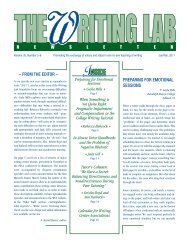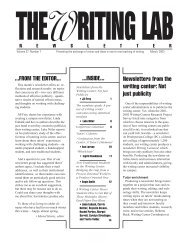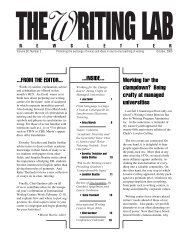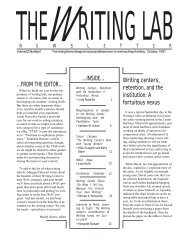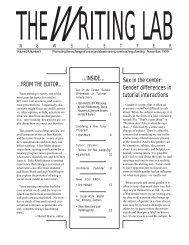We don't proofread here - The Writing Lab Newsletter
We don't proofread here - The Writing Lab Newsletter
We don't proofread here - The Writing Lab Newsletter
Create successful ePaper yourself
Turn your PDF publications into a flip-book with our unique Google optimized e-Paper software.
<strong>The</strong> <strong>Writing</strong> <strong>Lab</strong> <strong>Newsletter</strong><br />
W RITING CENTER ETHICS<br />
<strong>The</strong> ethics of content: Rhetorical issues<br />
in writing center conferences<br />
Students not only bring agendas,<br />
emotions, expectations, and classroom<br />
contexts to conferences; they also<br />
bring their papers. Student texts are<br />
the centerpiece of tutorial conferences.<br />
<strong>The</strong>y are both the focus of attention<br />
and the topic of conversation. <strong>The</strong>y<br />
embody a wide range of rhetorical<br />
views, issues, and perspectives, and<br />
writing center tutorials can address student<br />
texts at many different levels during<br />
the course of a conference. <strong>The</strong><br />
diverse nature of papers that are likely<br />
to come into the writing center poses<br />
interesting problems for tutors. If students<br />
are bringing in papers for courses<br />
in political science, biology, English,<br />
anthropology, electrical engineering,<br />
and the like, then a tutor’s expertise in<br />
each of these areas—in terms of content-area<br />
knowledge—is likely to vary<br />
widely. Sometimes tutors will be able<br />
to comment on content issues; other<br />
times they will not. To what extent<br />
should a tutor be responsible for knowing<br />
content and/or discipline-specific<br />
discourse conventions in a field before<br />
conferencing with a student Completely<br />
Some Not at all Alternatively,<br />
should the focus of writing center<br />
tutorials be on generic rhetorical<br />
issues which are unspecialized and applicable<br />
to nearly all domains of academic<br />
discourse <strong>The</strong>se are questions<br />
I have raised before, both <strong>here</strong> and in<br />
other venues. Answers to these questions<br />
will influence how tutors are<br />
trained for their positions as well as<br />
how students are scheduled for their<br />
appointments in the center.<br />
But disciplinarity is not the only ethical<br />
issue raised by some student texts.<br />
Every once in a while, the topics of the<br />
papers themselves can cause problems<br />
for tutors, either because they are strikingly<br />
inappropriate for academic<br />
coursework, politically volatile, patently<br />
offensive, or personally sensitive.<br />
Virtually all tutors who work in a<br />
writing center will, at some time during<br />
their employment, encounter a student<br />
paper whose thesis or tone offends<br />
them. Perhaps it will be a<br />
student who writes in support of institutionalized<br />
racism, or one who argues<br />
for the natural superiority of the female<br />
sex, or even one who praises the<br />
prosecutorial tactics of Kenneth Starr.<br />
Different tutors will have different buttons.<br />
But what should tutors do, ethically,<br />
when confronted with a paper<br />
expressing a point of view radically<br />
opposed to their own Should they grit<br />
their teeth and help the student support<br />
the thesis as best they can Should<br />
they take on the role of devil’s advocate<br />
and challenge the student’s thesis<br />
whenever and w<strong>here</strong>ver possible under<br />
the guise of “helping the student to<br />
consider possible counterarguments”<br />
Or should tutors opt out of the conference<br />
altogether, saying, “As much as<br />
I’d like to help you with your writing,<br />
you’re taking a position that I strongly<br />
disagree with. I think you’d be better<br />
off working with someone else.”<br />
How sensitive are tutors allowed to<br />
be with papers and students How<br />
supportive are they required to be<br />
when conferencing on papers that disturb<br />
them How responsible are they<br />
for guiding students away from inappropriate<br />
topics, tones, or stances and<br />
toward more mainstream, “acceptable,”<br />
academic discourse In my own<br />
writing center, I have a good deal of<br />
faith in the sensibilities and flexible attitudes<br />
of my tutors. <strong>The</strong>y are reasonable,<br />
responsible people who are willing<br />
to be flexible about their own political<br />
convictions and accommodate<br />
alternative points of view. This is not<br />
to say, however, that t<strong>here</strong> are not a<br />
few “abrasive” conferences from time<br />
to time, but most of my tutors’ venom<br />
and venting is saved for TA meetings<br />
w<strong>here</strong> they can share their experiences<br />
with a safe, empathetic audience. My<br />
one and only policy in this regard, the<br />
only one I’ve felt a need to state explicitly,<br />
is this: “You don’t have to<br />
take crap from anybody.” Though this<br />
policy is applied most often to aggressive<br />
students, it also applies more<br />
broadly to any circumstances in which<br />
the tutors feel distinctly uncomfortable—for<br />
any reason—in their tutorial<br />
conferences. In the section that follows<br />
and in my next few columns, I<br />
will try to identify a few of the troublesome<br />
rhetorical issues and positions<br />
that appear with some regularity in student<br />
conferences and that have also<br />
been the subject of some discussion in<br />
professional writing center literature.<br />
Papers about politics<br />
Human beings are political animals.<br />
This does not mean that we necessarily<br />
align ourselves with the platforms and<br />
principles of an organized political<br />
party, but we are all more or less invested<br />
in issues that have political consequences<br />
and political implications:<br />
abortion, civil rights, equal rights,<br />
taxes, etc. Student writers, too, have<br />
political opinions, and though those<br />
opinions are many times naive or unsophisticated,<br />
students often choose to<br />
express them in the papers they write<br />
for their classes. Often, these opinions<br />
appear in the “controversial issue” or<br />
“research” papers students are required<br />
10


